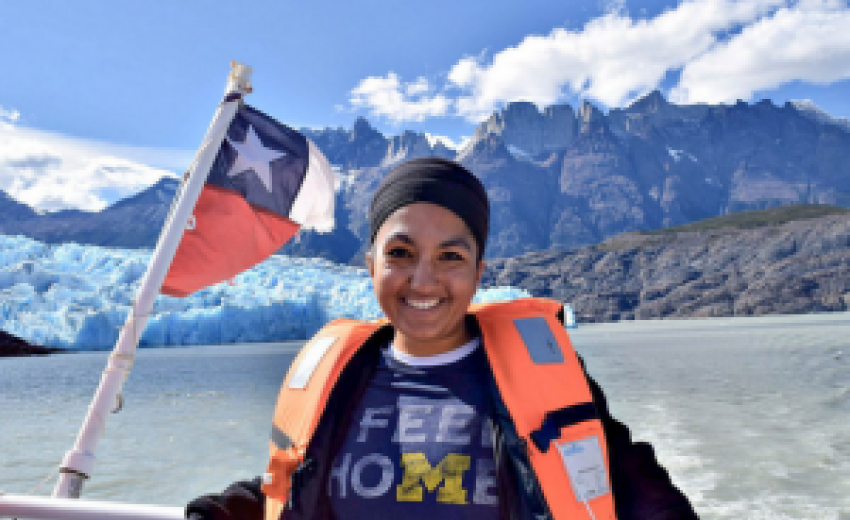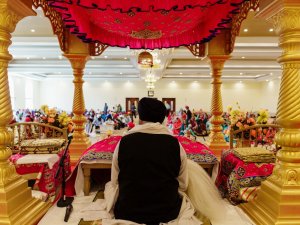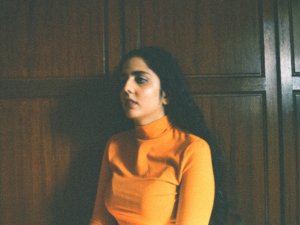TRAVELING THE WORLD FEMALE, SIKH & SOLO
On August 28, 2015, Harleen Kaur packed her bags to travel the world, solo, for an entire year. Kaur Life sat down with Harleen to learn about her adventures. In part one of this two-part series, she talks about her motivation, how the local sangat challenged her travel plans because she is a woman, and the highlights of each of the 13 countries she visited.
What prompted this trip?
Growing up, travel was a big part of my childhood, but primarily domestic travel; I had rarely left the US before last year. But, my father had instilled the idea of a global and experiential education through family museum visits, cross-country road trips, and evening viewings of PBS documentaries. As I finished my undergraduate education, I started to think more about the importance of a global education, in part due to my interest in advocacy, civil rights, and public policy as a first-generation Sikh American. Over the years, I found it more and more challenging to engage with and understand my Sikh identity without having an understanding of where I came from.
At the same time, I realized that I wasn’t mentally prepared to go directly to graduate school and started looking for alternative opportunities after graduation. I applied to several fellowships (year-long, funded opportunities) in the US and abroad and was fortunate to receive the Bonderman Fellowship, a scholarship that strives to increase US students engagement with the world in whichever career they choose.
What dates were you gone?
I initially went to South Africa with the professor I work with at the University of Michigan and 20 other students from May 21 to June 17, 2015. After that, I left on August 28.2015 for the Bonderman Fellowship and returned May 17.2016.
What was your parents’ reaction? Many Punjabi parents balk at the idea of their daughters traveling alone, did this happen to you? If so, how did you respond?
This trip was another point in my life where I was reminded of how lucky I am to have such encouraging and open-minded parents, especially when I think about the stereotypes of gender and parents in our community. Although they had the normal concerns that any parent would have, sending their child around the world by themselves for a year, I never felt that my parents were restricting me because lama woman. Any concerns they had were shown to me, sadly, by the way that South Asian and—more specifically—Punjabi Sikh men treated me as I traveled on my own.
The stereotypes you mentioned came mostly from our community as a whole. When news of my post-graduation plans started to spread to the local sangat, a lot of uncles and aunties would approach my parents, asking them why they were “letting me” do this. My mom’s immediate and constant response was, “You would let your son do it, so why not our daughter?”
When I received the fellowship, my parents and I sat down and talked about strategies for how I could keep myself safe and stay in touch with them throughout the trip. There were times that I felt their expectations were a bit unrealistic, but we have a very open relationship and so I communicated my thoughts to them, and we all adjusted. It was really nice to have them support me throughout the trip because they were the first ones I called or texted whenever I ran into a problem.
What were you expecting to discover about yourself on this trip? About the world? Was what you actually discovered different than what you were expecting?
Very naively, I did not realize how much I would learn about myself on this trip. I was very nervous about traveling alone, particularly because of how extroverted I am and how much I rely on the community around me. I was also very much someone who planned every detail of every day. This trip helped me to loosen a bit on both of those things, learning that I can be by myself and value that time, even if I find more energy when I am with other people. I certainly learned more about who I am as a person and what I need to make me happy, as well as what I truly want in life. Being away from the normal communal and societal pressures I faced, particularly as a young, Sikh woman, helped me to reflect deeply on what I felt outside of these pressures.
Interestingly, I felt the most unsafe on my trip were in South Asian and/or Punjabi spaces. I chatted about this a bit with the other woman fellow from my cohort, as she is Chinese American, and had similar experiences to me with “passing” but also not entirely “getting away” as a local. I often felt that in those spaces, people felt I was one of them but also that there was something different about me. Because of this dichotomy, it seemed that they felt they had a right to put me in my place.. .whether that was through comments, behaviors, or body language. Essentially, they could see I was South Asian/Punjabi, but I was acting in ways that were outside of the norm for women in that area, which didn’t sit right for them and their gendered hierarchies.
Regarding the world, I simply thought I would learn more about various cultures and communities, and how they lived in their day to day lives. I did do this to some extent, but I also saw that I have only skimmed the surface. My understanding was that we are more similar than I expected and a lot of the values that drive people around the world are linked. It is simply that the manifestations of these desires vary based on history, context, culture, community.
What was one highlight from each country?
- Japan: Walking through the Arashiyama Bamboo Forest and feeling completely at peace for the first time on my trip.
- China: Spending a week and a half in a village in southwestern China: a rural area filled with surreal levels of natural beauty, from rivers to karst mountain landscapes. The real highlight was renting, and learning how to ride, a motorbike and driving around the countryside on it.
- India: Punjab. Hands down Punjab. It was essentially my first experience there (I last went as a toddler so I had no memories of it).It’s a bizarre and life-changing feeling to be in an environment where everyone is exactly like you, particularly because I was feeling this for the first time in my life at the age of 22.
- Sri Lanka: Hiking to the top of Pidurangala Rock in Sigiriya in the rain; only to be met with the most beautiful view of never-ending greenery and nature that I have ever seen. I sat at the top of that rock: hundreds of feet in the sky, just in awe of the beauty of the hill country.
- Thailand: A one-day trek through the Doi lnthanon; or Cloud Forest in northern Thailand.
- Malaysia: Working with an award-winning social enterprise and NGO; Earth Heir.
- Singapore: Watching the nightly light show across the city’s skyline.
- Uruguay: Traveling through the entire country almost for free, all due to the incredible hospitality of a group of Kundalini yoga teachers.
- Argentina: Going to see the Buenos Aires Philharmonic three nights in a row in the famous Teatro Colon because they were performing pieces from my favorite composer, Tchaikovsky.
- Chile: Successfully completing a week-long trek through the famous Torres del Paine national park, which is known for its rigor and unpredictable weather conditions.
- Bolivia: Spending two days on Isla del Sol, a small island on the border of Bolivia and Peru that is filled with ancient ruins dedicated to the Sun God.
- Peru: Machu Picchu! After becoming severely ill and being on bed rest for 4 days, I finally trekked up to the top in perfect conditions—not a cloud in the sky: barely any crowds, and I even convinced the guards to let me stay a little past closing to enjoy the ruins on my own for a moment.
- Cuba: My final 24 hours. Although it was one fraught with travel problems, running out of money, terrible weather, and more, I thought it was the perfect final day of my fellowship. Being alone one last time allowed me to reflect on how much I’d grown over the last year and how capable I had found myself; able to achieve anything.
Check out part two of the interview where Harleen discusses other people’s perception of her dastar, the evolution of her Sikhi, Sikh communities in different countries, and gives advice to other Kaurs who want to see the world.
You can get a more in-depth look at Harleen's trip on her blog.






